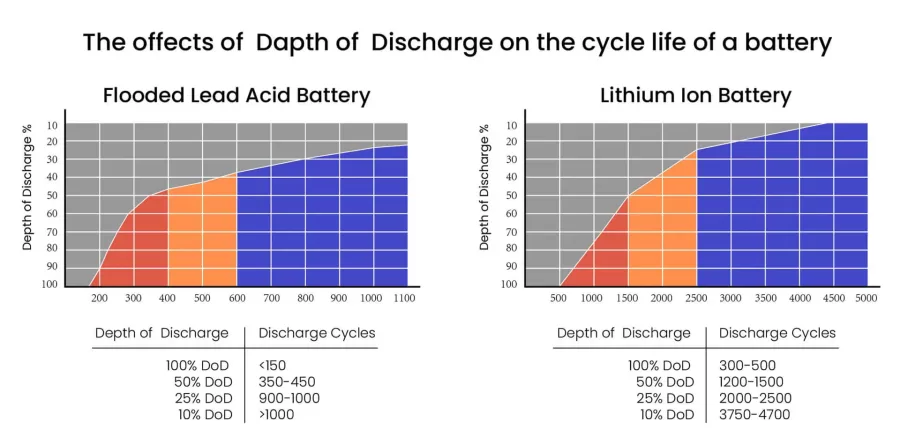When selecting a battery for your machine or device, you may be struggling to decide between the two most common battery types on the market: lithium-ion and lead-acid. Lead-acid batteries historically dominated the market before the invention of lithium-ion batteries in the ‘70s, but things have changed significantly over the last 40 years. Here are 10 reasons why lithium-ion batteries are the superior choice today. Let us examine and contrast the features of a lead-acid battery Vs lithium-ion battery.
Lead Acid Battery Vs Lithium Ion
1. Value
While lead-acid batteries may be cheaper at the time of purchase, they ultimately provide less value in the long run. Lead-acid batteries die faster, pose more risk, cause more issues, and work less efficiently than their lithium-ion counterparts.
2. Charging Capacity
Lithium-ion batteries carry a higher energy density than lead-acid batteries, meaning they can charge and discharge much more energy than lead-acid batteries of the same size. Lithium-ion batteries require less frequent charging than lead-acid batteries, resulting in fewer inconvenient charging breaks.
3. Charging Time
The lead-acid battery charging process is lengthy compared to the charging process of lithium-ion batteries. As a result, lead-acid battery users often need to have an extra battery on hand to use while their other battery charges. Lithium-ion batteries, on the other hand, charge about four times faster than lead-acid batteries.
4. Lifespan
CMB conducted an experimental comparison of lead acid battery vs lithium-ion battery life, lithium-ion batteries have a far superior lifespan to that of lead-acid batteries, usually lasting 5-10 times longer. Investing in a lithium-ion battery upfront means fewer additional and unnecessary purchases down the line for replacement batteries.
5. Depth of Discharge
Depth of discharge (DoD) is the percentage of a battery that can be discharged about the overall capacity of that battery. Lithium-ion batteries tend to be very efficient, with a depth of discharge of up to 80%. Lead-acid batteries, on the other hand, have an inefficient depth of discharge that only allows about 50% of the energy charged into the battery to be used.

6. Weight and Size
Lithium-ion batteries have a higher energy density, which means they tend to weigh about 50% less and be smaller in size than acid-lead batteries. A lighter and smaller battery allows for more design flexibility and results in a reduced load for your machine or device to carry, ultimately saving energy.
7. Maintenance
Maintaining the condition of lead-acid batteries can be a labor-intensive endeavor. Lead-acid batteries release gas as they operate, which must be disposed of using a unique ventilation system. This also means that charging them requires a designated space, which costs more money. These lead-acid batteries also must be watered down regularly with distilled water and cleaned of corrosion residue. Lithium-ion batteries, however, do not have these maintenance requirements.
8. Safety
The gasses that result from overcharging a lead-acid battery can become explosive. They can also leak corrosive battery acid, which can pose a hazard. Lithium-ion batteries can experience thermal runaway that can also lead to fires or sometimes explosions, but they typically come with a complex battery management system (BMS) that prevents this from happening.
9. Environmental Impact
The lead in lead-acid batteries often gets disposed of incorrectly, which results in the pollution of the earth and our water supply. Lithium-ion batteries, however, contain less toxic chemicals and metals and are considered to be more environmentally friendly than lead-acid batteries.
10. Installation
Lithium-ion batteries are individually sealed and therefore do not leak. This means that they can be installed sideways or upside down if necessary. Lead-acid batteries, however, can leak and need to be properly ventilated to avoid gas explosions. This means installing a lead-acid battery is a much higher-stakes process compared to the installation of lithium-ion batteries.
When it comes down to it, the time of lead-acid batteries has passed. Consider investing in custom lithium-ion battery packs for your device for a safer, more convenient, and more cost-effective experience. Have additional questions about lithium-ion batteries and how they can be customized for your specific application? Reach out to a CM Batteries representative today!



One thought
Thanks for bookmarking the page and commenting, I’m glad I could be of help to you!